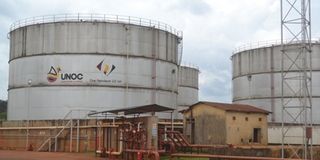Prime
Prioritise fuel reserves in 2022/2023 Budget

The government fuel reservoir in Jinja District. Photo / Denis Edema
What you need to know:
- The issue: Fuel reserves.
- Our view: Creation of strategic oil reserves will help the country cushion itself from the kind of unexpected shocks and disruptions in the economy.
The past few weeks have been difficult for most Ugandans. The fuel shortage in the country has exposed our economy to unexpected shocks.
With no clear fall-back position, our government seemed helpless and in the worst case scenario, fidgeted with explanation on what exactly happened to the country’s fuel reserves in Jinja. The fuel reserves are currently empty.
Insiders say, undisclosed clients picked most of the fuel in the reserves but didn’t replenish. The high demand in December and January made matters worse. The supply chain was broken and the shortage was inevitable.
In the countryside, fuel was costing an arm and a leg. A litre of petrol was selling at Shs12,000 and diesel at Shs8,000. Prime Minister Robinah Nabbanja at some point referred to an awkward Cabinet discussion and advised Ugandans to boycott expensive fuel stations. Her advice was akin to flogging a dead horse.
To protect citizens and ensure uninterrupted supply chain, the government should intervene by supplying cheaper but reliable fuel to dealers to stabilise the market and enable the country withstand supply shocks.
The effect of fuel shortage is clear-cut. Higher fuel prices affect more than just the cost to fill up at the gas station because higher prices have a clear ripple effect on the broader economy, in tourism, agriculture, and the transport sector etc.
The good news is that the fuel crisis is beginning to fizzle out. The lull offers us an opportunity to fix the mess. The fuel depot in Jinja must be refurbished and replenished in the 2022/23 Financial Year. The accountability aspects of the fuel reserves scandal should also be addressed as a matter of urgency. The country would like to know the people who depleted our fuel reserves.
Fuel is a critical component of our economy. Restocking our reserves must be one of the key government priorities in the next year’s Budget. MPs must also show seriousness. Creation of strategic oil reserves will help the country cushion itself from the kind of unexpected shocks and disruptions in the economy.
The 2007 post-elections violence in Kenya disrupted imports, including fuel and petroleum products to Uganda and other East Africa’s landlocked countries. We should have used this episode to fix the Jinja facility.
To avoid a repeat of previous mistakes, a reputable firm must be sourced through competitive bidding process to manage the fuel reserves. We must also increase capacity and fix management issues. We, therefore, propose an urgent meeting involving members of the House Budget Committee, Uganda National Oil Company (UNOC), Energy and Finance officials to discuss the draft plan for restocking Jinja and maintaining the strategic reserves.




